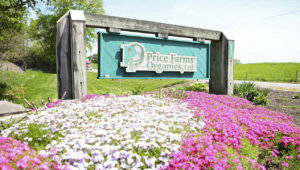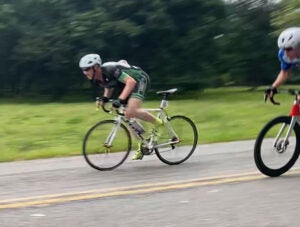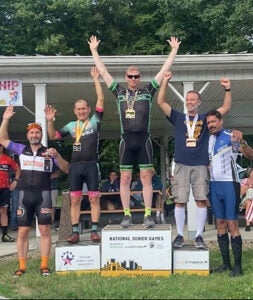In agriculture, we work with some narrow windows of opportunity. Maybe it’s finding just the right time for planting or being there the night a difficult calf arrives or getting the hay baled before a storm rolls in.
Yet those are nothing compared to Ohio farmer John Price’s cycling races. In a recent 25-mile race, the top four finishers came in within 1.5 seconds of each other. The 53-year-old Price was second place.
“I’m competitive, and I enjoy doing something that I’m competitive at,” he said.
Even if cycling gives him an outlet away from the farm, there’s no escaping his bond to agricultural life. Price is a fifth-generation farmer, living in the Delaware County house that his maternal grandfather grew up in.
That branch of his family was deep into pork production, where they had a few hundred acres and a farrow-to-finish purebred Hampshire operation. But by the time Price graduated with his construction degree from Columbus State University in the early 1990s, the breeding operation had begun to tail off.
He came back to the farm, where they soon had only one finishing floor for pigs and opted to add cattle and intensive rotational grazing. But Price and his family found their niche in 1998 when they began a Certified Class II composting facility able to take a variety of yard trimmings, brush, food waste, and manure and turn it into mulch, compost, and soil blends for their customers.
“That’s when the two — the farm and the compost facility — started their coexistence. And that was 25 years ago now,” he said. “Of course, we were already composting our hog and cattle manure for five or 10 years prior to that anyway, so, composting wasn’t all that new to us. But the scale that we’re doing it now, it’s definitely grown.”

Part of the mission of Price Farm Organics is to keep as many materials as possible out of landfills and upcycled for farm- and homeowners.
While Price still has a few hogs, more and more of the barn is being taken up by hay equipment, and some of his land, which is just north of Columbus, is now leased to a sod producer.
Amid his booming composting business, Price continued to stay active and find time to compete in a few sports. In high school, he played football, baseball, basketball, and golf — “I kinda did it all,” he said. He started his collegiate years at Otterbein University and played basketball there. After college, he played in some three-on-three hoops tournaments, traveling around Ohio and to neighboring Indiana to compete, as well as played a lot of softball.
In the late ’90s, he was talked into doing a duathlon — an event that is part running and part biking. Not fully knowing what to expect, he even had to borrow a bike to be able to compete at the race at Olentangy Caverns.
“I did that race, and after doing that, I knew that I loved cycling, so that’s what really got me into cycling and going from there,” he said.

Price describes himself as a bigger guy, more suited to sprinting than climbing events. He spent the next couple of years competing in triathlons, doing what a lot of entry-level racers do and signing up for sprint triathlons, which are much shorter versions of the grueling day-long Ironman races that are nationally popular. Price’s races were often akin to a 250-meter swim, 25-mile bike, and then a 5k run.
Those types of events “get people acclimated with transition,” he said. “You come off the swim portion, get your swim gear off and your bike shoes on, your helmet, and then getting out on the bike. Then you come back into another transition. … You’ve got to change your shoes and not forget things like taking your helmet off while heading into the run.”
For Price, though, his enjoyment kept coming back to the cycling side of it.
“I really loved cycling,” he said. “I loved going fast under my own power. To me, that was pretty cool.”
He then found his way to criterium racing, which are intense speed cycling races that loop around a short course in a two-block radius, for example. Riders are packed in, head-to-head, shoulder-to-shoulder, pedaling as hard as they can for maybe 20 or 25 laps.
Sounds dangerous, doesn’t it?
“Believe me, I had my share of crashes,” Price said. It’s the kind of sport where, during a bad crash, you hope the only thing that gets broken is the bike. (Yet somehow he’s managed to keep the same carbon fiber Look bike for nearly two decades.)
In one of his biggest crashes, Price said that another rider took out his front wheel while trying to move over, resulting in Price and about a dozen others in the ditch. Bam. Bam. Bam. Bike after bike was hitting Price in the back.
Criterium racing is generally a younger person’s sport, and as Price has gotten more … um … seasoned in age, he has shifted to what’s traditionally called road racing, where you’re out in the countryside and doing multiple larger loops of perhaps 5, 10, or 15 miles. Those races are all about drafting when possible, being toward the front, and, as he puts it, “trying to stay out of trouble” (translation: not crashing).
That’s the kind of racing Price was doing when he finished second in the tight span of cyclists this summer. He was in Pittsburgh for the 2023 National Senior Games, where he did four events — a 5k and 10k time trial and a 20k and 40k road race — doing very well in his age group.

Price has a lot of motivating people in his life. His wife is a runner and has completed about two dozen marathons. His uncle, too, was a runner and was the one who put the bug in Price’s ear about the senior games and the potential to qualify at the national level.
It’s a perfect avenue for someone with Price’s competitive streak. But does that competitiveness carry over to the farm.
Price laughs: “My employees would say, yes.”
But, he cautioned, “If you’re trying to do something competitively on the farm, you might lose focus of safety. So generally, when I’m talking to the guys, especially some of the high school kids that are working here, I always talk more about efficiency and not strictly being fast. Because if you’re in a hurry, that’s when accidents happen.”
Ryan Tipps is the founder and managing editor of AGDAILY. The Virginia Tech graduate has covered farming since 2011, and his writing has been honored by state- and national-level agricultural organizations.



